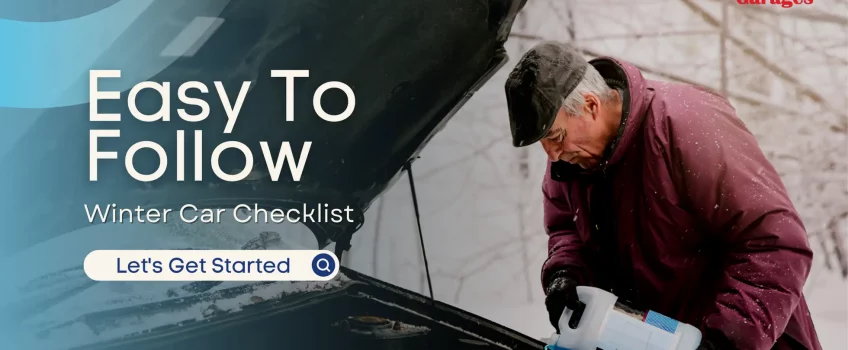
Winter Car Checklist: 10 Top Tips
Winter driving in the UK can be challenging with unpredictable weather conditions and the potential for snow and ice on the roads. As such, it’s important to ensure that your car is properly prepared for the winter months to help keep you and your passengers safe. In this article, you will find a winter car checklist with 10 simple but vital tips on how to prepare your vehicle for winter.
Winter Car Checklist And Tyres
Your car’s tyres are vital for safe winter driving since they are the only parts that connect your vehicle with the road. If your tyres are not in good condition, you are risking your life and that of other road users. Check that the tread depth is at least 1.6mm (legal tread depth limit in the UK) although experts suggest it should be 3mm for optimal safety.
If the tread is lower than the legal limit, it’s time to buy new tyres. You should also check the tyre pressure regularly and adjust it to the manufacturer’s recommended level, which can be found in your vehicle owner’s manual or on the inside of the driver’s door.
Do You Have Sufficient Antifreeze In Your Car?
Antifreeze is essential to prevent your engine from freezing in cold temperatures. Check the level of antifreeze in your car’s coolant reservoir and top it up if necessary. During winter, ensure that your radiator fluid antifreeze concentration is at least 50% — this will protect it from temperatures as low as -34 degrees and all the way up to 263 degrees. If you use plain water in place of coolant, it will freeze inside your car’s engine and leave you stranded!
Check Your Windscreen Wipers and Washer Fluid
Are your windscreen wipers part of your winter car checklist? They should be. With generally poor visibility in winter, it is essential that your windscreen is free from chips or cracks and always clean. That means making sure your windscreen wipers and washer fluid are in good condition. Check the wiper blades for any signs of wear and tear, and replace them if necessary.
While you could opt for winter wiper blades, they are designed to be more effective in extremely harsh conditions and not something normal drivers in the UK would need. Don’t forget to top up your washer fluid with a winter formula that won’t freeze in low temperatures.
Recommended: How To Safely Drive In The Snow
Checking Your Battery As Part Of Any Winter Car Checklist
Does cold weather impact my car battery? Lower temperatures certainly can take a toll on your car battery, so it’s important to make sure it’s in good condition. This includes looking for signs of corrosion on the battery terminals and testing the battery voltage with a multimeter. However, we recommend taking your car to a garage for a battery test with expert technicians.
Typically, a car battery usually lasts 3-5 years depending on the type of battery, driving habits and maintenance. If your battery is over 5 years old, it may be time to replace it. Make sure you add a battery inspection to your winter car checklist.
Are All Your Lights Working?
As with your windscreen, good visibility is crucial in winter. That means your car lights must be working correctly, including your headlights, brake lights, fog lights, and indicators. If anything is not working as it should, make sure to replace any bulbs before heading out. To further improve visibility, add checking and cleaning your lights to your winter car checklist to remove any dirt or debris.
Have You Checked Your Car Oil?
Cold weather can thicken engine oil, making it harder for the engine to turn over and operate efficiently. Check your car’s oil level and top it up if necessary. You should also consider switching to a winter-grade oil, which is designed to be more effective in cold temperatures. If you have any doubts about your car engine oil, contact your nearest Elite Garages for expert advice and assistance.
Don’t Leave Certain Items In Your Car
Part of our winter car checklist includes making sure you understand that there are certain items that you should never leave in a cold car. In many cases, the cold temperatures can damage them or make them less effective and here are some examples:
- Electronic devices such as smartphones, tablets, laptops, and cameras can be damaged by extreme cold temperatures. The batteries can drain faster, and the screen or components can become damaged.
- Aerosol cans, such as deodorant, hairspray, and spray paint, can explode or leak if left in a cold car as the pressure inside can change, leading to a potentially dangerous situation.
- Certain medications can be affected by cold temperatures and alter their effectiveness or even cause them to become dangerous.
- Cold weather can also damage musical instruments, such as guitars or violins as the wood can shrink or crack, and the strings become brittle or break
- If you leave cold drinks, especially carbonated ones, in a cold car, they can freeze and expand, causing the container to burst or crack.
Check Your Brakes
Your car’s brakes are essential for safe driving, so it’s important to ensure they’re in good condition. Have your brakes checked by a professional to ensure they’re working correctly. It’s also a good idea to ensure your brake fluid is topped up. If you think you need new brakes or an adjustment, visit the Elite Garages website today to book your brake replacement service.
Add An Emergency Car Kit To Your Winter Car Checklist
In case of an emergency, it’s a good idea to keep an emergency car kit in your car. This should include items such as a blanket, extra set of warm clothes, a torch, a shovel, a high-visibility vest, mobile phone charger and a first aid kit. You should also consider including food and water in case you get stranded for a prolonged period of time.
Regular Car Servicing
Regular car servicing is essential to keep your car in good condition, and this is especially important in the colder months. While you can perform some checks at home, a professional vehicle technician is trained to identify any potential issues with your car and fix them before they become a bigger problem. This can help prevent any inconvenient and potentially expensive breakdowns while driving in winter.
Conclusion: Why You Need A Winter Car Checklist?
A winter car checklist is essential to ensure your vehicle is in good condition in colder, wetter weather. Unprepared vehicles can cause a variety of problems, including engine trouble and loss of traction if tyres are not up to standard. A comprehensive winter car checklist will help you prevent any potential issues by making sure that your vehicle is properly prepared for the season.
By following the tips in this winter car checklist and booking your MOT you can ensure that you are as prepared as can be for winter driving. If your lights, brakes or tyres in particular are not in good working order, you greatly increase the risk of breakdowns and accidents. To ensure you stay safe this winter, drive slowly, keep your eyes on the road and keep this winter car checklist handy.
An emergency car kit should include items such as a first aid kit, flashlight with spare batteries, mobile phone charger, jumper cables, reflective triangles, ice scraper and snow brush, non-clumping kitty litter for traction on icy roads, blanket or sleeping bag for warmth in case of an unexpected breakdown and a shovel.
You should avoid leaving items in a car during the winter months, as cold temperatures can damage or ruin them due to freezing. This includes electronics like laptops and cell phones, liquids such as beverages or fluids for your car, medications, food items like fruit and vegetables, and plastic or rubber parts.
There are several things you should check on your car before the start of winter to make sure it is in good condition and ready for the colder weather. This includes checking your battery, antifreeze, tyre pressure and tread, car brakes and all your fluid levels (engine oil, transmission fluid, coolant and power steering). Book your winter safety check now!
About Us
Opening Times
Saturday : 8:30–4:00
Sunday : closed
More Information
Contact UsCustomer Information Pack
Check MOT Due Date
Free MOT reminder
Careers
Legal Information
Recent Posts
- Clutch Replacement Near Me: A Comprehensive Guide for UK Drivers
- Antifreeze Coolant: What It Is, How It Works, and When to Use It
- MOT in Brighton: Your Essential Guide to Testing, Servicing and Tyre Safety
- Uneven Tyre Wear Explained: Is It Time for a Wheel Alignment Service?
- Is Your Track Rod End Causing Problems with Wheel Alignment or Suspension?



